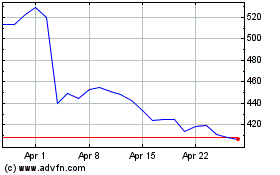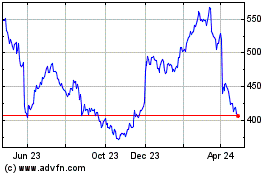Cosmetics Stocks Sag Amid Mask-Wearing -- WSJ
September 02 2020 - 3:02AM
Dow Jones News
By Veronica Dagher
This article is being republished as part of our daily
reproduction of WSJ.com articles that also appeared in the U.S.
print edition of The Wall Street Journal (September 2, 2020).
The coronavirus pandemic is changing the face of the makeup
business, but sales are expected to bounce back once there is a
vaccine.
As more women work from home and wear masks when they go out,
their desire for color cosmetics such as lipstick and blush has
plummeted. It has accelerated two trends in the industry: a focus
on skin care and "try-on" technology.
With no clear end date to coronavirus restrictions in sight,
makeup sales are likely to remain depressed and will continue to
weigh on the results of beauty companies.
Last week, Ulta Beauty Inc. reported that makeup sales, which
accounts for about half of the retailer's revenue, are still below
pre-pandemic levels. It declined to 43% of the retailer's sales in
its fiscal second quarter, down 4 percentage points from last year.
Despite weak makeup sales, the company posted better-than-expected
profit, as consumers made fewer trips to the store but spent more
when they shopped. Ulta said it earned 73 cents a share on sales of
$1.2 billion, down 28% from a year ago.
Makeup sales were already softening for about the past two years
partly because of some consumers' increasing preference for a more
natural look. According to research firm Mintel, U.S. retail sales
of color cosmetics are projected to be down 10.6% in 2020.
A lack of blockbuster makeup trends -- such as contouring, which
helped boost industry sales about five years ago -- hasn't given
consumers much to get excited about. Now, fewer social occasions,
remote work and increased demands for women with children are
further curbing interest in products.
In the past, women typically continued to buy small items such
as lipstick during an economic downturn. That was even when they
couldn't afford far more expensive luxuries such as vacations. In
the industry, this is known as the "lipstick index." Masks appear
to have shifted that behavior.
On its recent fiscal fourth-quarter earnings call, beauty giant
Estée Lauder Cos. also pointed to weaker makeup sales. Estée's
makeup sales fell 61%, because of the impact of Covid-19 on
consumer preferences, the company reported.
Ulta's stock has been volatile. Shares sank to $128.52 on March
18 but rebounded to $252.08 on June 5. On Monday, Ulta shares
closed down 2% to $232.18.
Estée Lauder shares sank to $144.38 on March 23 but the stock's
rebound has generally been steady since mid-May. Shares closed
Monday down 0.54% to $221.72.
For both stocks, and other beauty companies such as Coty Inc.,
skin care has been a bright spot. Some consumers have used having
more time at home to develop skin-care regimens using face creams,
lotions and serums.
"The lipstick index has been substituted by the moisturizer
index," Fabrizio Freda, chief executive of Estée Lauder, said on
the company's earnings call.
Burgeoning online sales have also been a growth driver for many
beauty companies. Ulta said e-commerce sales soared more than 200%
in its fiscal second quarter. The use of technology that enables
consumers to virtually "try on" makeup or take makeup classes is
also helping these companies stay engaged with consumers
online.
Demand for makeup for the coming holiday season may be soft if
social distancing curtails in-person parties and consumers'
spending is reduced. In addition, a generally downbeat outlook for
travel may continue to dampen makeup sales at airport duty-free
stops for the rest of the year, some analysts say.
The hope is that much of this may abate once the pandemic ends.
Certain shifts caused by the pandemic are likely to remain,
however, especially if changes such as working from home are
permanent.
Consumers' increased appetite for skin-care products is likely
to still grow, says Erinn Murphy, managing director at Piper
Sandler & Co. Curbside pick up, where customers buy items
online and pick them up outside the store, is poised to continue,
too.
Still, this sector relies on touch. So long as health and safety
concerns persist, consumers may be less likely to try new brands
and experiment with new products, analysts say. Without a vaccine,
social occasions and fresh innovation, makeup sales are likely to
stay depressed.
"The pandemic has given women permission to wear less makeup,"
said Stephanie Wissink, equity analyst at Jefferies.
Write to Veronica Dagher at veronica.dagher@wsj.com
(END) Dow Jones Newswires
September 02, 2020 02:47 ET (06:47 GMT)
Copyright (c) 2020 Dow Jones & Company, Inc.
Ulta Beauty (NASDAQ:ULTA)
Historical Stock Chart
From Mar 2024 to Apr 2024

Ulta Beauty (NASDAQ:ULTA)
Historical Stock Chart
From Apr 2023 to Apr 2024
